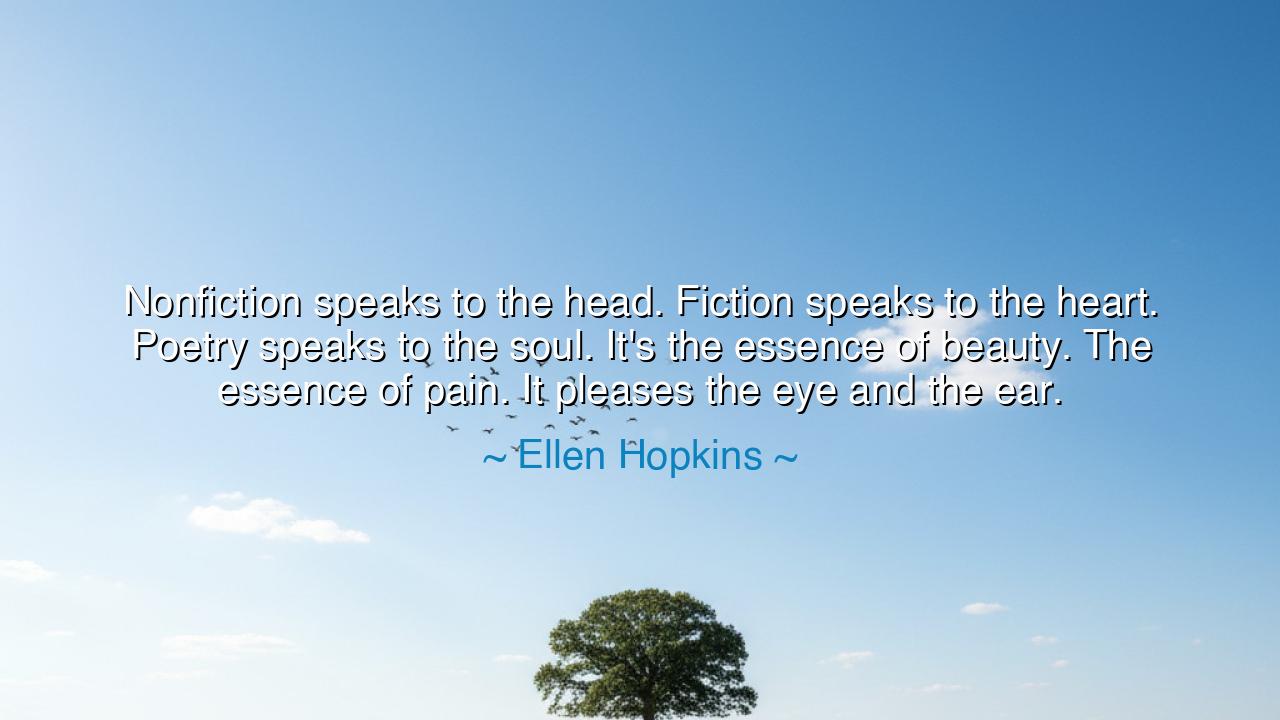
Nonfiction speaks to the head. Fiction speaks to the heart.
Nonfiction speaks to the head. Fiction speaks to the heart. Poetry speaks to the soul. It's the essence of beauty. The essence of pain. It pleases the eye and the ear.






Hear, O seekers of wisdom, the voice of Ellen Hopkins, who declared: “Nonfiction speaks to the head. Fiction speaks to the heart. Poetry speaks to the soul. It’s the essence of beauty. The essence of pain. It pleases the eye and the ear.” These words are not merely a classification of genres, but a revelation of how art speaks to the many layers of the human being. For man is not only intellect, not only emotion, not only spirit—but all three, woven together like the threads of a divine tapestry.
Nonfiction, as Hopkins says, addresses the head. It is the realm of fact, history, reason, and record. It seeks to inform, to instruct, to preserve truth in its rawest form. When Thucydides chronicled the Peloponnesian War, he spoke to the head of his readers, teaching them through example and analysis. Nonfiction equips us with knowledge, guiding us through the labyrinth of reality. But knowledge alone cannot sustain us—it is light without warmth, clarity without breath.
Fiction, then, turns to the heart. In its stories, the imagination clothes truth in human form. It teaches not only by fact, but by feeling, by immersing us in the struggles, desires, and triumphs of imagined lives. Consider Charles Dickens, who through his characters revealed the injustice of Victorian society. His tales stirred compassion more deeply than statistics ever could. Fiction awakens empathy, binding the reader’s heart to the joys and sorrows of another, reminding us that to be human is to feel.
Yet Hopkins declares that above these is poetry, the voice of the soul. Poetry does not explain as nonfiction does, nor narrate as fiction does—it transcends. It is the pure distillation of thought and emotion into music, into images that reach into the deepest chambers of the spirit. Beauty and pain dwell side by side in poetry, as they do in life. A single haiku can open eternity in three lines; a sonnet can contain the agony of love; a psalm can unite grief with hope. Poetry does not merely speak—it sings, it weeps, it burns, it soars.
History itself bears witness to this truth. When nations fall, their poetry remains. The ruins of Troy are silent, but Homer’s verses still echo. Empires rise and crumble, yet the poems of Rumi, Li Bai, and Neruda still breathe across centuries. Why? Because poetry speaks to the soul, and the soul is eternal. It pleases not only the eye with written word nor the ear with sound, but the inward self that longs for transcendence, for beauty even in suffering.
Thus, Hopkins teaches us that literature is not one thing but many, each serving a sacred purpose. The head needs truth, the heart needs story, the soul needs poetry. To neglect any is to live diminished. To embrace all is to live fully, nourished in mind, spirit, and body alike.
Therefore, O children of tomorrow, seek balance. Read nonfiction to sharpen the mind. Read fiction to soften the heart. Read poetry to awaken the soul. Do not treat poetry as a luxury or mere ornament—it is the essence of what endures. Write it, speak it, sing it, and let it shape the depths of your being. For when the head is wise, the heart compassionate, and the soul alive with poetry, then a human life becomes whole.






BPBg Pu
I find this quote so elegant because it acknowledges the different purposes of writing. Nonfiction informs, fiction immerses, and poetry transforms. But I can’t help wondering—are these roles shaped by the writer or by the reader’s emotional state? A person in pain might find more truth in fiction than in fact, and more comfort in poetry than in story. Maybe the true power lies in when we encounter each form in our lives.
SGcua sua gaming
Hopkins’s description feels both romantic and accurate. Poetry does seem to distill beauty and pain in a way no other form can. But it also makes me curious—does this mean poetry demands more of its readers? To truly feel its essence, one must slow down, listen, and reflect. In a fast-paced world, can poetry still hold the power to reach the soul when people rarely pause long enough to feel deeply?
BTTuyet Loan Bach Thi
This quote resonates deeply with me. It’s fascinating how Hopkins separates literature into three distinct emotional realms. Yet, I wonder if the boundaries are really that clear. Can’t great nonfiction move the heart, or fiction speak to the soul? Perhaps the real magic of writing lies in how these forms overlap—when a memoir feels poetic, or a novel teaches truth as vividly as any essay.
TTThu Trang
I love how this statement captures the emotional hierarchy of literature. It makes me wonder whether poetry truly reaches deeper than fiction or nonfiction, or if it just connects in a different way. Maybe poetry feels more universal because it doesn’t rely on logic or plot—it bypasses the intellect and touches something more primal. Do you think that’s why poetry endures even when people read fewer poems today?